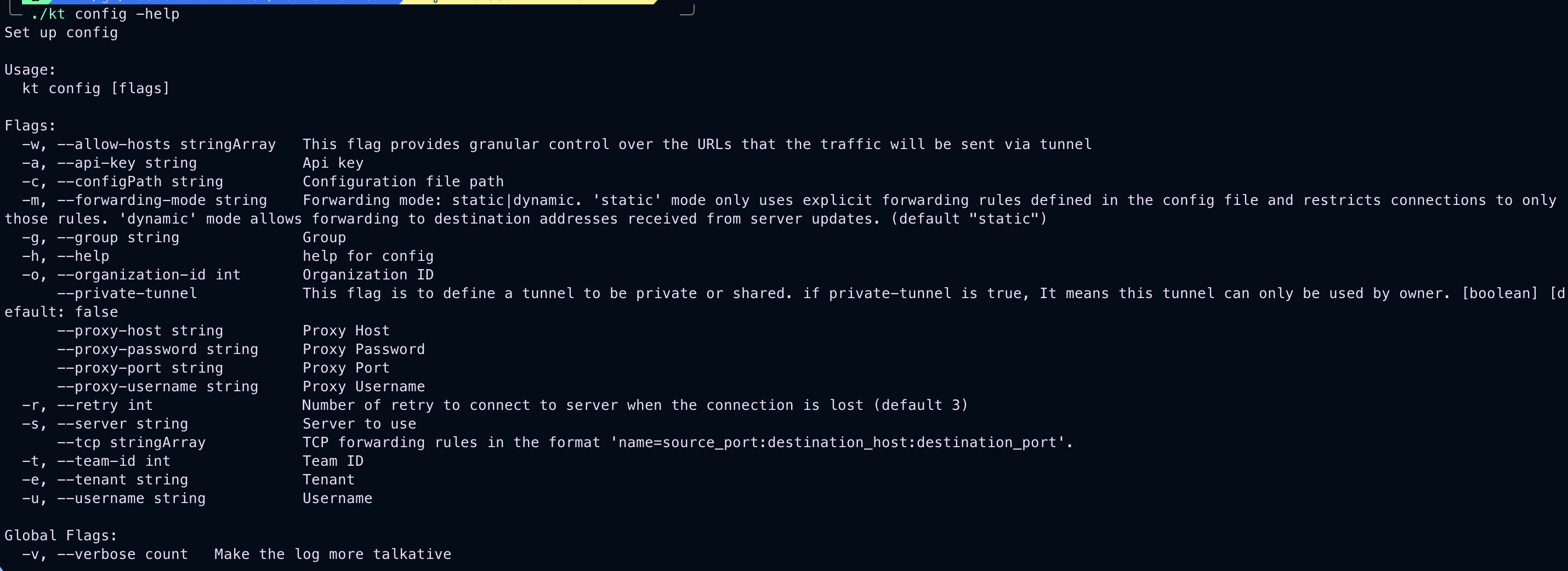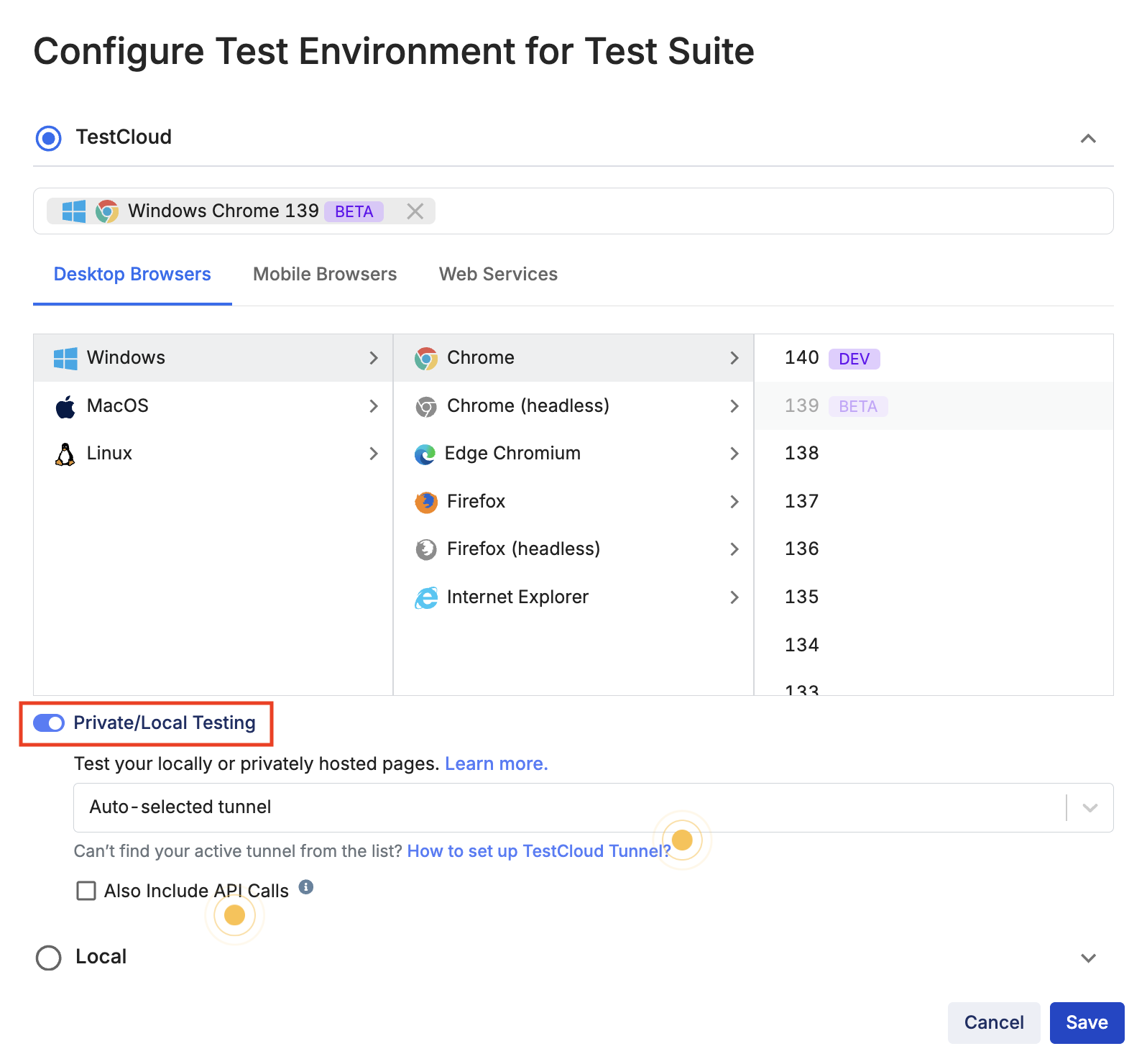Private database testing with TestCloud tunnel
- The following method applies only when running tests from TestOps. If you're running tests locally using Katalon Studio Enterprise in TestCloud environments, you do not need to use TestCloud Tunnel. Simply connect to your database directly using its actual host and port, as the test is executed from your own machine, which already has access to your internal network.
Introduction
In data-driven testing, you might need to connect to private resources (e.g., databases, SSH services, internal APIs) and run tests in TestCloud. However, due to network restrictions, TestCloud environments cannot access these resources.
Port forwarding allows you to securely forward network traffic from a local port to a remote private service. When enabled, TestCloud Tunnel automatically opens specified local ports and redirects traffic to the designated private resources within your network. You can then access private resources through these local ports in your test scripts.
How it works
- The Tunnel Client opens local ports on the TestCloud test node.
- Traffic sent to these local ports is automatically forwarded through the tunnel to the defined private destination addresses.
- This enables TestCloud test nodes to securely access internal resources via forwarded connections.
This guide walks you through setting up Port Forwarding Rules with TestCloud Tunnel to securely access your private resources from your local machine.
- You have configured TestCloud tunnel. This step is required to generate a
tunnelconfig, which allows you to establish connection to the private database. Follow this guide: Configure TestCloud tunnel in TestOps. - After copying the command from the Generate Configuration section and opening your Terminal or Command Prompt, follow the remaining instructions to connect to private databases using TestCloud Tunnel on TestOps.
Configure forwarding rules
To ensure secure and valid forwarding, each port forwarding rule must meet the following requirements:
- Each rule must follow the format:
testcloud_local_port:destination_host:destination_port. - TestCloud local port must be in the range:
50000to60000. - The rules must not have duplicate source ports (the local port is unique within the rules collection).
RULE_NAMEmust contain only alphabetic characters, and cannot contain numbers or special characters.- The maximum number of rules allowed per configuration is 5.
There are two options to configure forwarding rules: directly via the CLI (Command-line Interface), or via the tunnelconfig file.
Use the command-line interface
You can configure forwarding rules directly via the CLI, using the following format. This will automatically update your tunnelconfig file with the forwarding rules.
kt config --forwarding-mode static \
--tcp RULE_1=testcloud_local_port_1:destination_host_1:destination_port_1 \
--tcp RULE_2=testcloud_local_port_2:destination_host_2:destination_port_2
RULE: A short name you choose for your tunnel. It helps identify the connection.testcloud_local_port: A port you choose (between 50000–60000) opened on the Test Node. You’ll connect to this as if your database is running locally.destination_host: The actual hostname of your private database.destination_port: The port your database uses (typically, based on the type of DB).
Example
kt config --server=https://tunnel-manager.katalon.com --api-key=xxxx --username=demo_user@katalon.com --organization-id=123456 --tenant=TestOps --private-tunnel=false --team-id=123456 --forwarding-mode static \
--tcp QA_BOOKS_DB=50000:qa-books-postgresql.rds.amazonaws.com:5432 \
--tcp STAGING_BOOKS_DB=50001:staging-books-postgresql.rds.amazonaws.com:5432 \
--tcp QA_USERS_DB=59999:qa-users-sqlserver.rds.amazonaws.com:1433 \
--tcp STAGING_USERS_DB=60000:staging-users-sqlserver.rds.amazonaws.com:1433
./kt config --help to see usage instructions.
Use the tunnelconfig file
After successfully running the command to generate the TestCloud tunnel configuration in the Generate configuration section, a tunnelconfig file will be created.
- Open the
tunnelconfigfile. - Add or update the
forwarding_modesettings to static. This will only traffic matching the pre-defined forwarding rules will be allowed. Other requests are rejected.forwarding_mode = "static" - In the
[tcp]section, add the forwarding rules.[tcp]
RULE_1 = "testcloud_local_port_1:destination_host_1:destination_port_1"
RULE_2 = "testcloud_local_port_2:destination_host_2:destination_port_2"
RULE: A short name you choose for your tunnel. It helps identify the connection.testcloud_local_port: A port you choose (between 50000–60000) opened on the Test Node. You’ll connect to this as if your database is running locally.destination_host: The actual hostname of your private database.destination_port: The port your database uses (typically, based on the type of DB).
Example
allow_hosts = []
api_key = 'xxxxx'
group = 'yyyyy'
inactive_tunnel_timeout = 0
organization_id = 1111
private_tunnel = false
proxy_host = ''
proxy_password = ''
proxy_port = ''
proxy_username = ''
relay_protocol = ''
retry = 3
server = 'https://tunnel-manager.katalon.com'
team_id = 1111
tenant = 'TestOps'
username = 'demouser@katalon.com'
forwarding_mode = "static"
[tcp]
QA_BOOKS_DB = "50000:qa-books-postgresql.rds.amazonaws.com:5432"
STAGING_BOOKS_DB = "50001:staging-books-postgresql.rds.amazonaws.com:5432"
QA_USERS_DB = "59999:qa-users-sqlserver.rds.amazonaws.com:1433"
STAGING_USERS_DB = "60000:staging-users-sqlserver.rds.amazonaws.com:1433"
Start the tunnel
Once the configuration is set, simply start the tunnel as usual:
- Windows
- macOS
- Linux
kt start
/Applications/kt start
./kt start
The Tunnel Client will automatically open and forward the specified ports.
Use forwarded ports in test scripts
For convenience, TestCloud Tunnel exposes each forwarded local port as an environment variable.
The environment variable for each rule is named as TUN_<RULE_NAME>.
You can use this environment variable in your test scripts to connect to the private service without hardcoding any connection details. For example, for the rule QA_BOOKS_DB = "50000:qa-books-postgresql.rds.amazonaws.com:5432", TestCloud Tunnel will automatically set an environment variable named TUN_QA_BOOKS_DB on the Test Node.
Simple example with PostgreSQL
import java.sql.Connection
import java.sql.DriverManager
import java.sql.ResultSet
import java.sql.ResultSetMetaData
import java.sql.Statement
'Connect to the DB'
String hostAndPort = System.getenv("TUN_QA_BOOKS_DB") // localhost:50000
hostAndPort = (hostAndPort == null) ? 'qa-books-postgresql.rds.amazonaws.com:5432': hostAndPort // If you're running tests on your local machine, you don’t need to use TestCloud tunnels. Just connect to your database using its actual host and port directly.
String dbName = 'books'
String connUrl = "jdbc:postgresql://" + hostAndPort + "/" + dbName
String username = 'mydemouser'
String password = 'mydemopwd'
Connection connection = DriverManager.getConnection(connUrl, username, password)
'Query data from the DB'
Statement stmt
ResultSet resultSet
List<Map<String, Object>> rows = []
Map<String, Object> row
try {
stmt = connection.createStatement()
resultSet = stmt.executeQuery('select * from books where id = 1 limit 10')
ResultSetMetaData metaData = resultSet.getMetaData()
while (resultSet.next()) {
row = [:]
for (int i = 1; i <= metaData.columnCount; i++) {
String columnName = metaData.getColumnName(i)
Object value = resultSet.getObject(i)
row[columnName] = value
}
rows.add(row)
}
} finally {
try {
if (resultSet) resultSet.close()
} catch (Exception ignored) {}
try {
if (stmt != null) stmt.close()
} catch (Exception ignored) {}
}
'Verify the data is correct'
println rows // [[id:1, name:Katalon Testing Book, owner:5, created_at:2025-06-20 13:43:28.890988, updated_at:2025-06-20 13:43:28.890988]]
WS.verifyEqual(rows[0]['name'], 'Katalon Testing Book')
'Close the DB connection after use'
connection.close()
Result
Once you've finished the setup, enable the Private testing toggle to run tests in tunnel mode with TestCloud environment on TestOps.
